John Ley, our Interim Treasurer and member of METRO GAD (formerly Greenwich Association of Disabled People), explains.
At all levels within METRO Charity from the Board of Trustees through the staff to our service users you will find Disabled People, a term which under the welfare system includes neurodivergent people and those with learning difference as well as people living with mental health issues. Disability benefits provide essential support to people who are disabled by systemic barriers so that they can survive, participate, and live with dignity.
The government’s Green Paper proposes the biggest cuts to Disability benefits on record. The government argues that these cuts will ‘incentivise’ Disabled people to find work. But they are wrong. Cutting this support will not only deepen hardship it will also push people further from work and inclusion and increase health inequality.
One of the proposed changes is to Personal Independence Payments, or PIP. Being Disabled costs money: whether that’s for mobility equipment, home adaptations, prescriptions, transport, paid support, higher heating costs or specialised diets. PIP is not an out-of-work benefit, it is there to support Disabled people to live independently. Cutting PIP will increase hardship and isolation for Disabled people. For those who currently work, removing PIP may make it impossible to remain in the workforce.
As tackling health inequality is a prime function of METRO Charity, along with celebrating difference and supporting marginalised communities: we need to speak out. Many of METRO GAD’s members and service users will be adversely affected, causing increased stress and anxiety, and placing extra demand on our vital welfare advice services.
If the government really wanted to support Disabled people into employment, it would start by:
- Fixing accessibility in workplaces and the wider community
- Improving public transport accessibility
- Tackling discrimination and low pay
- Investing in proper adjustments and flexible working
Real change will only come through investment – in health, housing, care, inclusive employment support, and accessible workplaces.
As Debbie Abrahams, Labour lead on the work and pensions select committee, stated in the Commons:
